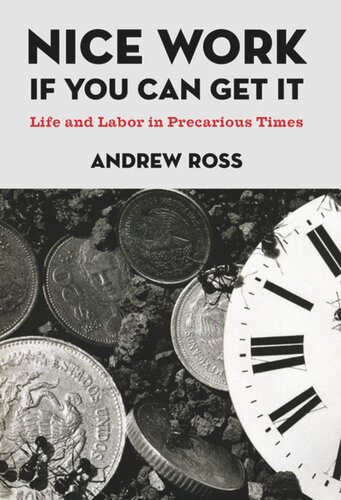

Most ebook files are in PDF format, so you can easily read them using various software such as Foxit Reader or directly on the Google Chrome browser.
Some ebook files are released by publishers in other formats such as .awz, .mobi, .epub, .fb2, etc. You may need to install specific software to read these formats on mobile/PC, such as Calibre.
Please read the tutorial at this link: https://ebookbell.com/faq
We offer FREE conversion to the popular formats you request; however, this may take some time. Therefore, right after payment, please email us, and we will try to provide the service as quickly as possible.
For some exceptional file formats or broken links (if any), please refrain from opening any disputes. Instead, email us first, and we will try to assist within a maximum of 6 hours.
EbookBell Team

4.7
16 reviews2009 Choice Outstanding Academic Title
Is job insecurity the new norm? With fewer and fewer people working in steady, long-term positions for one employer, has the dream of a secure job with full benefits and a decent salary become just that—a dream?
In Nice Work If You Can Get It, Andrew Ross surveys the new topography of the global workplace and finds an emerging pattern of labor instability and uneven development on a massive scale. Combining detailed case studies with lucid analysis and graphic prose, he looks at what the new landscape of contingent employment means for workers across national, class, and racial lines—from the emerging “creative class” of high-wage professionals to the multitudes of temporary, migrant, or low-wage workers. Developing the idea of “precarious livelihoods” to describe this new world of work and life, Ross explores what it means in developed nations—comparing the creative industry policies of the United States, United Kingdom, and European Union, as well as developing countries—by examining the quickfire transformation of China’s labor market. He also responds to the challenge of sustainability, assessing the promise of “green jobs” through restorative alliances between labor advocates and environmentalists.
Ross argues that regardless of one’s views on labor rights, globalization, and quality of life, this new precarious and “indefinite life,&” and the pitfalls and opportunities that accompany it is likely here to stay and must be addressed in a systematic way. A more equitable kind of knowledge society emerges in these pages—less skewed toward flexploitation and the speculative beneficiaries of intellectual property, and more in tune with ideals and practices that are fair, just, and renewable.